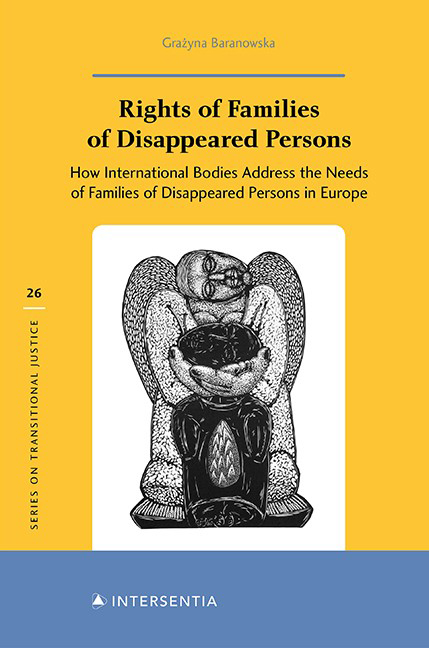Book contents
- Frontmatter
- Acknowledgements
- Contents
- List of Cases
- Chapter 1 Introduction to the Rights and Needs of Families of Disappeared Persons
- Chapter 2 The European Court of Human Rights and Disappeared Persons: Broadening in Substantiating Claims and Narrowing Down Through Application of Temporal Competences
- Chapter 3 The UN Human Rights Committee and Disappeared Persons: Approaches to the Right to Life
- Chapter 4 International Judicial Bodies Established in Response to Conflicts in the Former Yugoslavia: Addressing Mass Disappearances
- Chapter 5 Searching For and Exhuming Disappeared Persons: International Non-Judicial Mechanisms
- Chapter 6 Conclusion: Addressing Rights and Needs of Families of Disappeared Person in Europe
- Index
Chapter 5 - Searching For and Exhuming Disappeared Persons: International Non-Judicial Mechanisms
Published online by Cambridge University Press: 10 December 2021
- Frontmatter
- Acknowledgements
- Contents
- List of Cases
- Chapter 1 Introduction to the Rights and Needs of Families of Disappeared Persons
- Chapter 2 The European Court of Human Rights and Disappeared Persons: Broadening in Substantiating Claims and Narrowing Down Through Application of Temporal Competences
- Chapter 3 The UN Human Rights Committee and Disappeared Persons: Approaches to the Right to Life
- Chapter 4 International Judicial Bodies Established in Response to Conflicts in the Former Yugoslavia: Addressing Mass Disappearances
- Chapter 5 Searching For and Exhuming Disappeared Persons: International Non-Judicial Mechanisms
- Chapter 6 Conclusion: Addressing Rights and Needs of Families of Disappeared Person in Europe
- Index
Summary
COMMITTEE ON ENFORCED DISAPPEARANCES
The Committee on Enforced Disappearances (CED), is – like the Human Rights Committee (HRC) – one of the treaty bodies operating within the UN established to monitor the implementation of human rights conventions by state parties. While Chapter 3 analysed the case law of the HRC, the CED is included in this chapter, as it predominantly analyses its non-judicial competences. The Committee was established on the basis of Article 26 of the International Convention for the Protection of All Persons from Enforced Disappearance (ICPPED, Convention). The delegations negotiating the content of the ICCPED failed to reach an agreement on whether it was necessary to establish a separate body to monitor the implementation of the ICPPED. Therefore, it was decided to convene – after the entry into force of the ICPPED – a conference of states parties to decide whether it was appropriate to transfer monitoring of the Convention to another body (Article 27 of the ICPPED). The conference was held on 19 December 2016, but the Committee's competences were not delegated to another body.
The CED adopted Rules of Procedure which provide regulations on the mode of work of the Committee. It holds regular sessions. The number of annual sessions is set by the UN General Assembly (UNGA); so far members of the Committee have met in two sessions each year in Geneva. The first took place in 2011. In accordance with Article 36 of the ICPPED, the Committee submits to the UNGA an annual report on its activities. As of March 2021, the Committee has adopted and published nine reports, covering 18 sessions (from November 2011 to September 2020).
Among the 62 states parties to the Convention, there are 20 European countries. They are, in the order of their being bound by the ICPPED: Albania, France, Germany, Spain, Armenia, the Netherlands, Serbia, Belgium, Montenegro, Bosnia and Herzegovina, Austria, Lithuania, Portugal, Slovakia, Greece, Ukraine, Italy, Switzerland, the Czech Republic, and Norway. Russia and Turkey, where the most disappearances have occurred in the past two decades, have not yet become bound by the ICPPED, and have not even signed it. It is therefore unlikely that in the upcoming years the Committee proceedings will play a significant role in addressing the needs of disappeared persons and their families in Europe.
- Type
- Chapter
- Information
- Rights of Families of Disappeared Persons , pp. 173 - 210Publisher: IntersentiaPrint publication year: 2021



